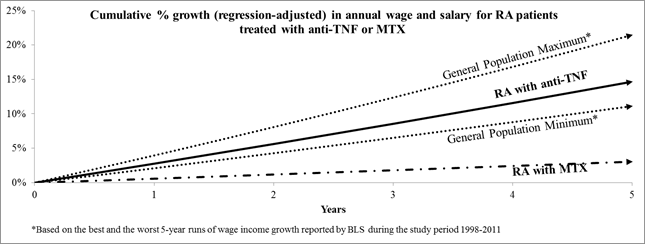Session Information
Session Type: Abstract Submissions (ACR)
Background/Purpose: RA negatively impacts patients’ work outcomes. Treatment with tumor necrosis factor inhibitors (anti-TNFs) has been associated with improved work productivity and stability in RA. However, no studies have assessed the impact of anti-TNF treatment on changes in RA patients’ income over time. Our study aims to compare growth of wage and salary income over time between employees with RA treated with anti-TNFs and those treated with methotrexate (MTX).
Methods: Adults with ≥ 1 RA diagnosis (ICD-9 CM: 714.0) were identified in a large-scale U.S. claims database (OptumInsight, 1998-2011). Patients were stratified into the following two groups: 1) those who filled ≥1 prescriptions for anti-TNFs, either with or without MTX (index date defined as the date of the first anti-TNF prescription) and (2) those who filled prescriptions for MTX monotherapy (index date randomly selected). During the 6-month baseline period preceding their index prescription, patients in both groups were required to have continuous health plan enrollment and to be free of anti-TNF prescriptions. The primary study outcome was annual wage or salary income (US dollars) observed from index year up to five years of follow-up (more than 90% of patients were lost to follow-up after five years). The effect of treatment on wage and salary income growth over time, starting from the same initial annual income, was assessed using a multivariable generalized linear model with adjustment for index year, age, region, gender, Charlson Comorbidity Index, health plan and total RA-related cost in the baseline period. Based on this regression model, income growth was compared to expected wage growth for the general population based on the best and worst 5-year runs of national wage data reported by Bureau of Labor Statistics during 1998-2011.
Results: The study included 1,866 patients in the MTX cohort and 1,848 patients in the anti-TNF cohort. At the index date, the MTX and anti-TNF cohorts had, respectively, average ages of 48.4 and 46.1 years, 64.8% and 62.0% females and average annual wage and salary income of $51,554 and $56,674. After adjusting for baseline characteristics, wage and salary incomes for patients in the anti-TNF cohort increased by 2.8% (CI: 1.9% – 3.6%) per year, significantly greater (p<0.05) than the 0.6% (CI: -0.2% – 1.4%) per year increase estimated for the MTX group. Based on this regression analysis, the average growth in wage and salary income for an RA patient treated with anti-TNF was consistent with that of the general population. In contrast, wage and salary growth for an RA patient treated with MTX was significantly lower than expected in the general population (p<0.05).
Conclusion: Compared to MTX monotherapy, anti-TNF treatment is associated with a greater rate of annual income growth among employees with RA. In the anti-TNF group, income growth rate is comparable to the general employed population norm.
Disclosure:
M. J. Bergman,
AbbVie,
5;
G. De,
AbbVie,
5;
A. X. Ganguli,
AbbVie,Inc.,
1,
AbbVie, Inc.,
3;
J. Signorovitch,
AbbVie,
5;
Y. Bao,
AbbVie, Inc.,
1,
AbbVie, Inc.,
3.
« Back to 2013 ACR/ARHP Annual Meeting
ACR Meeting Abstracts - https://acrabstracts.org/abstract/assessment-of-wage-and-salary-growth-in-patients-with-rheumatoid-arthritis-ra/

